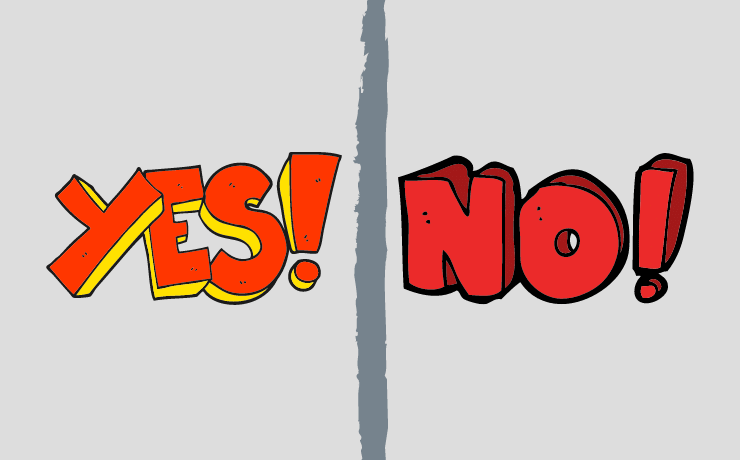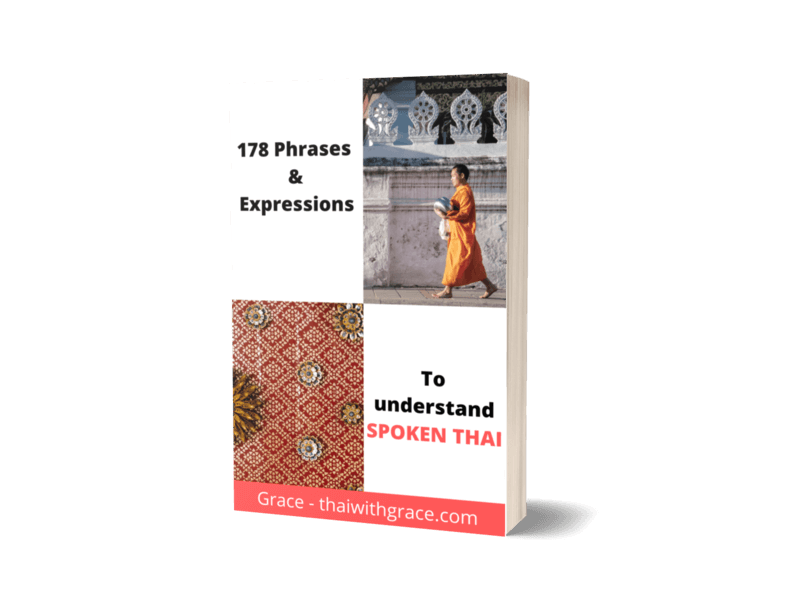As a Thai teacher, I often see students that take classes with me ask, “How do I answer yes or no to that question?”. Here I would like to explain all the ways to say yes in Thai and all the ways to say no in Thai. I’ll explain different situations and also point out very common mistakes that students make when trying to say YES or NO in Thai.
I want to make it clear that ไม่ (Mâi) is a negation word which translates to no or not BUT unlike in English, you can’t just say ไม่ every time you want to say No. It is more nuanced in Thai, as you will learn in this article.
Similarly, ใช่ (Châi) is “yes” but there are more ways to say yes as we will see in this article.

1. Repeat the verb
To say yes in Thai is as easy as repeating the verb from the question.
To say no in Thai is as easy as adding mai (meaning “no”) before the verb from the question.
I.e: Choose the first verb from the question (i.e: do you want to eat). Repeat the verb (want / no want) to answer yes or no. It might sound blunt and cavemen-like in English to just repeat the verb but it sounds totally normal in Thai.
Examples saying yes in Thai
- Question:
Do you want to go?
อยากไปไหม (อยาก is the verb meaning “to want”)
yàak bpai măi
Answer:
Yes (but in Thai, it’s “want”)
อยาก (literally: to want)
yàak - Question:
Do you like to eat Thai food?
ชอบกินอาหารไทยไหม (ชอบ is the verb meaning “to like”)
chôp gin aa-hăan tai măi
Answer:
Yes (but in Thai, it’s “to like”)
ชอบ (literally: to eat)
chôp
Examples saying no in Thai
- Question:
Do you like to eat seafood?
ชอบกินอาหารทะเลไหม
chôp gin aa hăan tá-lay măi
Answer:
No (but in Thai, it’s “no like”)
ไม่ชอบ (literally: don’t like)
mâi chôp - Question:
Do you want to go?
อยากไปไหม (อยาก is the verb meaning “to want”)
yàak bpai măi
Answer:
No (but in Thai, it’s “no want”)
ไม่อยาก (literally: don’t want)
mâi yàak
2. ใช่ Châi & ไม่ใช่ Mâi châi
A common mistake that non-Thais makes is using Châi and Mâi châi for all of the Yes and No questions. ❗️ Beware that Châi and Mâi châi only mean ‘I am, you are, it is, we are, they are‘ and ‘I am not, you are not, it is not, we are not, they are not‘.
It is often used to answer ใช่มั้ย/ ใช่ไหม châi mái/châi măi type questions which means ‘right?’ or ‘am I?, are you?, is he?, is it?, are we?, are they?‘. Please note: the mái from the question word is not the same mâi meaning ‘no’.
Examples:
- Question:
You are Thai, right?
คุณเป็นคนไทยใช่มั้ย
kun bpen kon tai châi mái
Answer:
Yes/No
ใช่/ไม่ใช่
châi/mái châi - Question:
Students like to sit here, right?
นักเรียนชอบนั่งที่นี่ใช่ไหม
nák rian chôp nâng têe nêe châi măi
Answer:
Yes/No
ใช่/ไม่ใช่
mái/châi măi
3. คะ ká and ครับ kráp
ká and kráp can be used at the end of sentences to make them politer and also, in this case, be used as a polite yes and no answer.
For women, use ká to mean ‘yes’. Guys use kráp. When saying ‘no’ put ไม่ mâi in front of them (mâi ká, mâi kráp).
Examples:
- Do you want to go?
อยากไปไหมคะ
yàak bpai măi ká
Yes, I want to go
คะ อยากไปคะ
ká yàak bpai ká - Do you like to eat seafood?
ชอบกินอาหารทะเลไหมครับ
chôp gin aa hăan tá-lay măi kráp
No, I don’t like
ไม่ครับ ไม่ชอบครับ
mâi kráp, mâi chôp kráp
ká and kráp can also be used to respond to someone calling you.
For example:
- Hey, Ann!
คุณแอนครับ
kun Ann kráp
Yes…
คะ…
ká…
4. เออ อืม er · eum, ไม่อะ mâi à
When talking to a friend of the same age or younger, using polite particles (ká and kráp) sounds way too formal.
Instead of using ká and kráp you can say เออ, อืม (er, eum) for yes and ไม่อะ (mâi à) for no.
For example:
- Do you want to go?
อยากไปไหม
yàak bpai măi - Yes, I want to go
อืม อยากไป
eum yàak bpai - Do you like to eat seafood?
ชอบกินอาหารทะเลไหม
chôp gin aa hăan tá-lay măi
No, I don’t like
ไม่อะ ไม่ชอบ
mâi à, mâi chôp
5. ได้ dâi
This word means ‘can’. When people ask you something you can answer with ได้ dâi if you think that it’s possible (yes) or that you can do what they requested.
Examples:
- Let’s travel?
ไปเที่ยวกันไหม
bpai tîeow gan măi - Yes!
ได้ (literally: can)
dâi
Sometimes the question is very precise asking literally if you can or can not, here you have an option between ได้ and ไม่ได้ mâi dâi
- Can we have dinner at 8pm?
วันนี้กินอาหารเย็นสองทุ่มได้ไหม
wan née gin aa-hăan yen sŏng tûm dâai măi
I can’t because I have an appointment
ไม่ได้คะ มีนัดแล้ว
mâi dâai ká · mee nát láew
Summary
The ways to say yes in Thai (depending on the situation so make sure to read the entire post) are:
- Repeating the verb
- Châi ใช่
- kráp ครับ, ká คะ
- dâi ได้
- er, eum เออ, อืม
The ways to say no in Thai (depending on the situation so make sure to read the entire post) are:
- Mâi + Repeating the verb
- Mâi châi ไม่ใช่
- Mâi kráp ไม่ครับ, Mâi ká ไม่คะ
- Mâi dâi ไม่ได้
- Mâi à ไม่อะ
Try to avoid answering mai and chai to all questions (unless appropriate) in order to sound more Thai!

